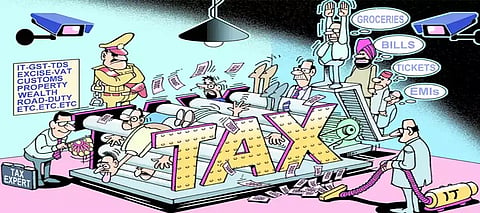

The debate over whether India’s billionaires contribute their fair share in taxes, or if the fiscal burden disproportionately falls on the common man, remains a contagious issue. While billionaires and large corporations assert their role in driving economic growth through investments and job creation, critics argue that their tax contributions are minimized through systematic loopholes and tax avoidance strategies. Meanwhile, the common populace bears a significant burden through indirect taxes like the Goods and Services Tax (GST), which tend to impact lower-income groups more heavily.
According to the Oxfam India report released in 2023, the richest 1% of the population of India owns more than 40% of India’s wealth, while millions struggle below the poverty line. This disparity sharpens the debate about the role of billionaires in India. Are they, indispensable contributors to national growth, or do the liabilities of their wealth and influence evade accountability?
India’s billionaires and high-net-worth individuals (HNIs) wield substantial influence, often sharpening industries, markets, and policies. While many contribute to economic growth and philanthropy, others have been accused of exploring loopholes, evading taxes, and even renouncing Indian citizenship for personal gains
India employs a progressive tax system for individual taxpayers, where higher incomes are subject to higher tax rates. Corporate taxes are also imposed in business. However, the structure often favors those who can exploit legal loopholes:
India’s billionaires, while significantly contributing to the economy, often benefit from tax exceptions, incentives, and offshore arrangements. Key issues include;
Gautam Adani: allegations have surfaced regarding the use of offshore entities for transactions, raising questions about transparency.
Mukesh Ambani: while Reliance Industries pays substantial taxes, its effective tax rate is often reduced due to legitimate exceptions and rebates.
Alleged fugitives like Vijay Mallay and Nirva Modi: these individuals have been involved in finance fraud cases, contributing to the perception of billionaires exploiting the system.
Contributing to GDP: reports indicate that the richest 1% in India own a substantial portion of the country’s wealth, yet their contributions remain opaque.
Tax revenue: the total tax revenue from corporations and HNIs is often overshadowed by revenue from GST and other indirect taxes.
Wealth disparity: studies have highlighted the growing gap between the rich and poor, emphasizing the need for equitable tax policies.
In developed countries, billionaires often face stricter tax regimes. For instance:
India, however, lacks a specific wealth tax, relying primarily on income and corporate taxes.
Fugitive Economic Offenders Act (2018): this act allows the government to confiscate the properties of economic offenders who flee the country
Digitalization of Tax systems: Initiatives like faceless assessments and stricter reporting norms aim to curb tax evasion.
International cooperation: India has signed agreements with several countries to exchange financial information and combat offshore tax evasion.
Altogether, billionaires play a crucial role in India’s economic growth, and their tax contributions often fall short of expectations. The common man, meanwhile, shoulders a disproportionate burden through indirect taxes and limited relief. To achieve a more equitable system, India needs strict tax enforcement for every section of the people indiscriminately, thereby closing loopholes, and considering measures like wealth taxes. Hopefully, then can fiscal responsibility be balanced between billionaires and ordinary citizens.